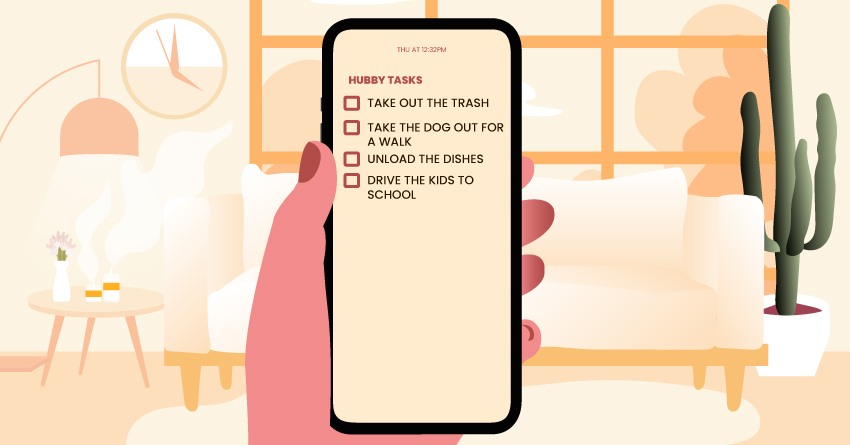
Have you ever felt worn out by the never-ending pile of demands and responsibilities you have to do? That means that you’re jampacked with mental load. Without even lifting a finger just yet, just thinking about it and planning your next moves feels burdening already. Hence, finding ways to balance the load out and promote better communication in dividing tasks and taking initiative is important.
If you’re dealing with such heavy load, this guide will navigate you through it and lessen the weight.
What is Mental Load?

Healthline defines mental load as “the invisible, non-tangible tasks involved in running a household.”
It’s in looking after every single thing needed to be accomplished to keep the home intact, making sure not to forget anything on your to-do lists of varying fields, and even assigning tasks to people in the house (and checking in on them). It can come to the point that it feels never-ending and energy-draining.
Such load is also coined as cognitive labor and worry work. While anyone can experience mental load, it’s been quite an issue among women, especially mothers. Aside from keeping the house afloat, they must remember their children’s schedules and other needs. This can be caused by the ancient societal expectation that women care for the family and the house. They’re also seen as nurturing beings, emphasizing their household importance.
But aside from the household, mental load is prevalent in your other personal relationships. And for that, we’ll get into it later on.
Harmful Effects of Having Too Much Mental Load
Understand further what risks are in store if you’re overwhelmed with mental load down below.
1 It leads to all sorts of negative emotions.

This effect occurs because you’re the only one keeping things afloat. Even more so when you remind them to pull their weight, there’s already effort in doing that. In turn, it can make you frustrated at their non-compliance. It also makes you annoyed and stressed that the repetition still isn’t working on them, especially when you’ve already divided such tasks before sticking and following. The ideal outcome is that there should be less reminding, and things should be done automatically.
Hence, feeling that type of way is valid and also detrimental to your health if it keeps happening.
Aside from that, you can feel panic if you forget an important task or if you do assign a task, but they don’t do it right to your liking.
2 Burnout is possible.

Such an effect can take a while to recover from. That’s because your entire body, from the physical, mental, and even emotional aspects, is exhausted. You’re more likely to feel helpless and detached from the things you enjoy. It’s also possible to take a longer time to do your tasks, which can affect the structure you’ve built over time.
Thus, you’re putting yourself at risk of burnout by not letting people know of your mental load and letting them help you.
3 You’re more prone to getting sick.

With all these previous effects mentioned, it’s only a matter of turn that it’ll take a toll on your body. In terms of physical aspects, you can have sleeping problems, fever, and overfatigue, to name a few. Chronic illnesses are also a possibility here. Mentally-wise, depression and anxiety can potentially be acquired.
4 You have low self-worth.

Over time, you put your self-worth on how well you can shoulder all this mental load and execute them successfully. And when you lack in any area, you internalize it and doubt your capabilities.
5 You become detached from everything that matters to you.

We’ve mentioned this earlier, but we want to emphasize it further. If you’re a parent with endless responsibilities, you start to forget who you are when you’re overloaded with mental load. You put yourself second and your family first, making sure everything runs smoothly and all. However, in the long run, your own cup starts to go empty, and you no longer know what other tasks you like that don’t involve your family.
The same can also be said for those in a relationship, wherein they prioritize their partner first, then themselves, and do what it takes to keep things afloat. But again, without balance, things are going to crumble hard on you.
Examples of Mental Load

Browse through this list for a better understanding of what mental load can look like on a day-to-day basis and in various relationships.
- Having your partner ask for help: “Let me know if you need help”, “Tell me when you need me” or “You should’ve asked!”. Yeah, you’ve definitely heard these lines before. And even if they mean good, it’s still giving your partner responsibility to figure out what’s wrong. Asking is not the same as helping them or taking the initiative to see what areas need fixing.
- Suddenly readjusting your day to accommodate your sick child
- Having little to no time for personal self-care and space
- Being the one scheduling everything (even if it’s not your appointment)
- Tracking parental tasks, like doctor’s appointments, who picks up the kids on what days, your child’s hobby schedules, etc.,
- Checking in on your kids
- Cancelling your own plans to adjust to your partner’s free time
- Making all the lists (to-do, grocery, etc.)
- Praising or rewarding just to help you with chores or any important tasks
- Dealing with missed mess after assigning a task (ex: asking a partner to clean the dishes but not clean any dirt left in the sink)
How to Properly Explain What Mental Load Is
If you want to address this issue to the best of your abilities, this informative section shows you just how.
1 Take into account when and where you bring it up.

Talking about your mental load is an important topic requiring privacy and deep discussion. Thus, scheduling this kind of discussion can give you the necessary space to freely share your thoughts and worries with them.
2 Explain to them that it’s more than just worrying.

It’s so common for partners of the person with mental load to try and cease a deep conversation about what’s going on at home (ex: the laundry is always all over the place, the dirty dishes are stacked on the sink, not having enough time to inspect the pantry and go to the grocery) by saying “you’re worrying too much” as if to defuse their overthinking. While that’s true, it doesn’t solve the issues at hand. Even more so if their partner is taking enough action to help them.
Thus, it’s important for their partner to not say statements like that and observe the areas where they need help so there are fewer conversations like this.
3 Find common ground.

What’s something you both value and cherish in your relationship? If it’s mutual honesty, you can introduce this topic of mental load like “I value how honest we are with each other, so I want to share that I feel like I’m pulling most of my weight at home. I’m grateful at how willing you are to help, but I prefer you take initiative when I get too busy to speak up.”
Using “I” statements allows you to narrate your feelings rather than pining any blame on them.
4 Tell them that you want to share the management.

This step is the main goal we want to achieve when there’s an imbalance of mental load. By this time, you’ve opened up about how you feel about all these tasks on your plate. You’ve also made it clear that you need an extra hand to avoid overworking yourself. In turn, you’d prefer that they take the initiative to observe and give a helping hand without either you asking for help or them asking as much as possible. Keeping your home, space, and family (if applicable) intact is a two-way job after all.
5 Provide them with guides like this one.

Mental load is a complex topic that can be solved and handled when both parties have a clear idea. Hence, keep doing your research on the topic to further help one another shoulder the weight and have a more harmonious relationship overall.
How to Share the Mental Load
Now that you’ve given them (and even yourself) a better idea of what mental load is, further explore this section on how to successfully divide and share the cognitive load down below.
1 Discuss it with them.

While knowing what mental load is a lot better, it’s time to apply it in your relationship. See what aspects need to be improved and why these changes need to be made. This conversation is similar to the kind of convo when you explain mental load, except now you tell them precisely what needs to change to ensure things are much more stable and equal at home.
2 Be more concrete and intentional in planning and dividing tasks.

Sure, dividing tasks like chores can be a piece of cake to other couples. But it’s still a common outcome for one person to feel more overwhelmed than the other because some tasks have heavier mental weight than others. For example, organizing what groceries are need may be more taxing than buying them in the supermarket.
Don’t just consider the physical tasks and divide them as is. Ponder over the mental tasks linked to them. Aside from the example below, the physical task of cleaning the bedroom requires the mental aspect of setting a schedule on when and how to do it (ex. whole space weekly or certain aspects daily).
The goal here is to balance things out in your relationship. Hence, this step is bound to have lots of trial and error, and changes must be made in between to ensure the workload is equal in both the physical and mental aspects.
3 Set boundaries.

Boundaries are present to protect you from harm. In this case, it’s to protect your well-being and energy from overexhaustion. Moreover, the absence of boundaries leads to heavy mental load in the first place.
With that in mind, you’re allowed to say no to certain tasks and pass down other chores to other people when needed. This gives the people around you more responsibility and lessens the long-term burden on you.
4 Be willing to let go of your control.

This step may be tough when you’ve established a certain way of doing things, but it is key to give yourself a break and trust your partner more.
In other words, give them space to do things their way. When you do notice something you’re if you’re and want a different, much better solution, tell them your whys so they can understand where you’re coming from. It also avoids micromanaging along the way.
While giving them the freedom, you may still bring up any slip-ups that they do consistently that may be harmful in the long-run. For example, not picking up any laundry that fell on the floor as it might make someone slip.
Letting them take on tasks their way and not be controlling opens you to more opportunities for growth and a clearer idea of how your partner works. You also avoid constantly cleaning up for them if you’re pikon and want things your way only, leaving them to always think that you’ll fix their mess.
5 Have daily, regular check-ins.

Just like how you have those weekly meetings at work to check in with your boss and tell them what you’re up to and such.
Checking in with each other consistently gives you two clarity on how you’re feeling, and even shares what can be improved. For example, you like how they pick up the kids since their school is nearer to their workplace, but notice that they miss out on any trash left inside the car. Hence, you’d know it would be ideal to double-check next time before leaving it.
6 Have your kids involved.

Aside from your partner, delegate certain tasks to your kids to lessen the weight and learn how to care for their home. What they learn from you will significantly impact their upbringing and how they navigate life as they get older. It also teaches them that you shouldn’t shoulder everything and that asking for help and sharing the load can solve many things.
Takeaway
Mental load, whether at home or in any personal relationship, opens your mind to where your life lacks balance and equality. In turn, it’s key to discuss this with your partner and kids (if applicable). We all need to help each other and take the initiative when the need is present.
Moreover, reading the room is another great skill to adopt here in alleviating some’s mental load. It’s also important to see how you can be of assistance without someone telling you what they need. Almost like mind-reading, but more on instincts.
For more guides like this one, you can check us out on the Lauvblog here.


